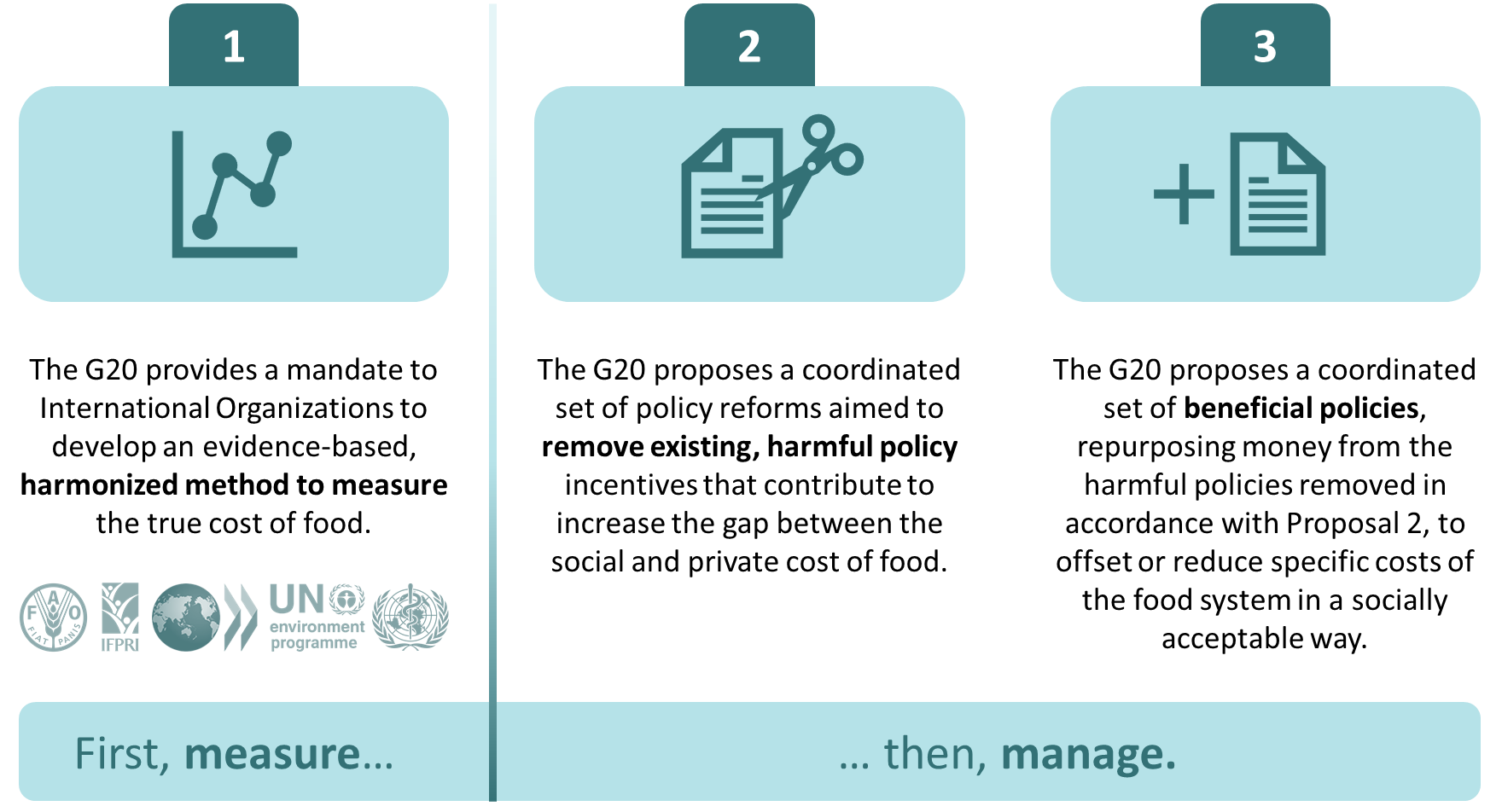What do we mean by the “true cost” of food?
When people think of food prices, they typically think about the price paid by consumers at the time of purchase (the “private cost”). However, this price may not include all the costs to society. These “social costs” also encompass environmental and public health impacts stemming from practices and features of global and local food systems—including air and water pollution, overdrawn aquifers, antibiotic resistance, and diet-related diseases like diabetes. While consumers don’t pay these costs upfront, the costs are borne by society later in other ways: for example, reduced harvests as a result of land erosion or soil degradation.
Policy can shape which social costs emerge and their significance by influencing four food system drivers: how much we produce, what we produce, how we produce, and where we produce. Some of these factors cross borders, thus affecting international public goods. When they do, they become international social costs that require international policy to be appropriately addressed.
|
“‘Social costs’ also encompass environmental and public health impacts stemming from practices and features of global and local food systems—including air and water pollution, overdrawn aquifers, antibiotic resistance, and diet-related diseases like diabetes.” |
Has the true cost of food been measured?
In our G20 Policy Brief, we compile a variety of existing estimates of some of the social costs of food in the United States and compare them to other food-system-wide estimates. Unfortunately, no internationally harmonized approach to measure the true cost of food currently exists. Without such an approach, it is difficult for countries to even discuss these issues, let alone consider reform.
What should be done?
The G20 is well situated to act as a leader in catalyzing international governance to address the challenges surrounding the true cost of food. We offer three proposals for G20 action: (1) mandating the development of a globally harmonized measurement of the true cost of food, (2) coordinating reform of harmful policies, and (3) setting the agenda for the introduction of beneficial policies. Proposal 1 would provide the knowledge-sharing needed to promote a common language and vision among G20 countries, while Proposals 2 and 3 comprehensively address critical policy reforms.

To begin the process, the G20 must give a mandate to the international scientific community, including organizations such as the UN Food and Agriculture Organization (FAO), the Organization for Economic Cooperation and Development (OECD), IFPRI, the UN Environment Programme (UNEP), the World Health Organization (WHO), and the Meetings of Agricultural Chief Scientists of G20 States (MACS-G20), to develop a harmonized method to measure the true cost of food. This method could be a central contribution to the United Nations Food System Summit in 2021 if it is consistent, evidence-based, and robust across countries and food products. The international scientific community will be able to use this measurement method to assess the relative magnitude of various social costs of food and to identify key policy types that contribute to food systems’ “hidden” costs. The G20 can then use this assessment to coordinate policy reforms aimed at removing harmful policy incentives that increase the social cost of food, and to propose beneficial policies that offset or reduce specific food system costs in socially acceptable ways. G20 member countries could repurpose money from the harmful policies removed in accordance with Proposal 2 for the beneficial policies in Proposal 3.
|
“By establishing a clear understanding and measurement of the true cost of food, including all market failures, countries will be better able to design and repurpose their current agricultural policies to achieve a triple win: improved productivity, resilience, and environmental stability.” |
By establishing a clear understanding and measurement of the true cost of food, including all market failures, countries will be better able to design and repurpose their current agricultural policies to achieve a triple win: improved productivity, resilience, and environmental stability.
Think20 (T20) is a G20 engagement group that connects and collaborates with think tanks around the world to provide ideas and recommendations to G20 leaders. This blog originally appeared at Food Security Portal and pulls from one of the briefs published by the T20 task force on Sustainable Energy, Food, and Water Systems, one of ten T20 task forces for this year’s Saudi Arabia G20 Presidency..
 David Laborde is a Senior Research Fellow in the Markets, Trade and Institutions Division and the Theme Leader on Macroeconomics and Trade for the International Food Policy Research Institute. He has a doctoral degree in International Economy from the Université de Pau et des Pays de l'Adour
David Laborde is a Senior Research Fellow in the Markets, Trade and Institutions Division and the Theme Leader on Macroeconomics and Trade for the International Food Policy Research Institute. He has a doctoral degree in International Economy from the Université de Pau et des Pays de l'Adour
 Marie Parent is a Research Analyst at the International Food Policy Research Institute. She provides support to cross-country research on SDGs 2.1, 2.3, and 2.4. Her projects involve multiple partner organizations and methodologies including CGE modelling, cluster analysis, and systematic reviews. Marie holds a Master of Public Policy from the University of California, Berkeley.
Marie Parent is a Research Analyst at the International Food Policy Research Institute. She provides support to cross-country research on SDGs 2.1, 2.3, and 2.4. Her projects involve multiple partner organizations and methodologies including CGE modelling, cluster analysis, and systematic reviews. Marie holds a Master of Public Policy from the University of California, Berkeley.
 Valeria Piñeiro is a Senior Research Coordinator at the International Food Policy Research Institute. She received her Ph.D. in Agricultural Economics from the University of Maryland and she is also a faculty member at the Johns Hopkins University Advanced Academic Programs. She has consulted for many organizations, including the World Bank.
Valeria Piñeiro is a Senior Research Coordinator at the International Food Policy Research Institute. She received her Ph.D. in Agricultural Economics from the University of Maryland and she is also a faculty member at the Johns Hopkins University Advanced Academic Programs. She has consulted for many organizations, including the World Bank.
Note: The opinions expressed in this article are the responsibility of the authors and do not necessarily reflect the opinion of IICA.
|
Do you have questions or suggestions to improve the BlogIICA? Please write to the editors: joaquin.arias@iica.int and viviana.palmieri@iica.int |
Add new comment